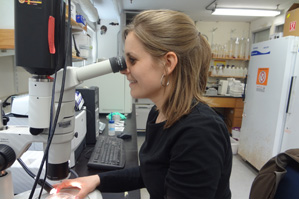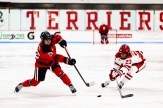Guest post: Life lessons from counting phytoplankton


As part of her co-op, Sam Wessel is doing research with graduate student Jennifer Elliott at the Marine Science Center this semester. Photo courtesy of Sam Wessel.
Today’s post was generously contributed by Samantha Wessel, an undergraduate biology major who’s currently on co-op at Northeastern’s Marine Science Center in Nahant, Mass. Among other things she’s doing up there, she’s also working as a technician in Mark Patterson’s lab with graduate student Jennifer Elliott. You can read more of Elliott’s story in the accompanying news@northeastern post here. Enjoy!
There are things they don’t really tell you as an undergraduate student. They say you can go on to do research, to get your masters or PhD, but they don’t tell you how it works. They don’t tell you how much time and effort you have to put in to collect and process samples, analyze data, write up protocols, defend your research, and even more that I, as a third-year undergraduate, probably don’t even know about, yet.
It wasn’t until I took a position at the Northeastern University Marine Science Center in Nahant, Mass. that I even began to consider what really goes into the whole process. Over the last three months I’ve been spending my time in three completely different labs at the MSC: the Helmuth lab, which has a large outreach focus; the Hughes-Kimbro lab, which focuses on salt marsh dynamics; and the Patterson lab, where I have been working closely with one of the graduate students. Each lab has provided a totally different experience and taught me a little more about what life after graduation might be like.
When I volunteered to help Jennifer Elliott (in the Patterson Lab) sort zooplankton on Tuesday mornings, I was so nervous. I mean…my only lab experience comes from the chemistry and biology labs I had to take as a Marine Biology major. If I messed up in one of those it wasn’t the end of the world. But with Jennifer, there was three years worth of research on the line! What if I messed it all up and misidentified everything?!
Luckily, it wasn’t NEARLY that bad. I actually kind of got the hang of it. And, man, can I tell a copepod apart from crab larva, or what? In the morning, I would go into the lab and get set-up at the fanciest dissecting scope I have ever used (or seen, for that matter). The samples are from the waters near Mauritius, Jennifer’s home, where she took samples of the water for about three months and ran it through these super small strainers, called sieves, where she was able to sort the microscopic zooplankton into three different size classes. She preserved them in alcohol and brought them back here to analyze them.
My job was to go through the samples to identify and count the little planktonic animals called zooplankton. Jennifer provided me with guides and images to help me remember what was what but more often than not, I would pick out the ones I knew for sure (the most distinctive were the copepods and worms) and then get a confirmation on everything else. Every once in awhile, I would come across an animal that would stump us both. The first time that happened, I couldn’t even think of what would happen next if it were my project…But Jennifer had the answers! We took some pictures of the mysterious little critter and she sent them off to her friend who is an expert on Mauritian plankton. And then we saved him in a separate vial, in case she needed to look at him again.
The more I worked with Jennifer, the more I realized that research isn’t just about being out in the field. Hundreds of hours go into processing and analyzing the samples you’ve collected for “just” a Ph.D. or masters. If you want to become a full-fledged professor, there are years more of researching and writing papers and advising the next generation of graduate students. It seems absolutely daunting, but at the same time, incredibly rewarding and has made look upon graduate students and professors with a new-found level of respect and admiration. They are the proof that all that work is totally worth it.





